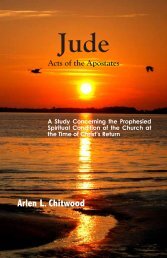Signs in John's Gospel - The Lamp Broadcast
Signs in John's Gospel - The Lamp Broadcast
Signs in John's Gospel - The Lamp Broadcast
You also want an ePaper? Increase the reach of your titles
YUMPU automatically turns print PDFs into web optimized ePapers that Google loves.
78 SIGNS IN JOHN’S GOSPEL<br />
obedience, which had resulted <strong>in</strong> a complete reversal of conditions<br />
perta<strong>in</strong><strong>in</strong>g to the nation’s call<strong>in</strong>g (Lev. 26:14-39; Deut. 28:15-67).<br />
Israel’s spiritual condition and position at this time was that<br />
of a son be<strong>in</strong>g chastened because of disobedience (cf. Zech. 1:14, 15).<br />
Or, to place the matter with<strong>in</strong> another frame of reference, it was<br />
that of God deal<strong>in</strong>g with an adulterous wife who had been caught up<br />
<strong>in</strong> harlotry among the nations (cf. Jer. 3:1-3).<br />
And, view<strong>in</strong>g the matter from either vantage po<strong>in</strong>t, it is evident<br />
that the whole of Christ’s message to Israel had to do with th<strong>in</strong>gs<br />
beyond the thought of eternal salvation, particularly s<strong>in</strong>ce “signs”<br />
were <strong>in</strong> view. His message had to do with deliverance relative to the<br />
nation’s condition and the k<strong>in</strong>gdom be<strong>in</strong>g proclaimed. And deliverance<br />
effected through receiv<strong>in</strong>g the Christ, believ<strong>in</strong>g, for the Jews at this<br />
time (whether <strong>in</strong> the offer of the k<strong>in</strong>gdom preced<strong>in</strong>g the events of<br />
Calvary or the reoffer follow<strong>in</strong>g) must be understood accord<strong>in</strong>gly.<br />
(For more detailed <strong>in</strong>formation along these l<strong>in</strong>es, refer to the<br />
author’s book, FROM ACTS TO THE EPISTLES, particularly the first<br />
four chapters.)<br />
Those Jews receiv<strong>in</strong>g the Christ at His first com<strong>in</strong>g <strong>in</strong> John 1:12,<br />
13, through believ<strong>in</strong>g on His name, were said to be “born…of God<br />
[‘brought forth out of God’]” and given the right to become “the<br />
children of God.” And, as previously noted, such an act centered<br />
around deliverance, with the k<strong>in</strong>gdom <strong>in</strong> view, not eternal salvation.<br />
<strong>The</strong>se were Jews, part of a nation which comprised God’s firstborn<br />
son (Ex. 4:22, 23), though a disobedient son, be<strong>in</strong>g given the<br />
right to become “children of God” through receiv<strong>in</strong>g the Christ and<br />
be<strong>in</strong>g brought forth out of God. And acceptance, belief on the part<br />
of the people, could only have had to do with the manner <strong>in</strong> which<br />
Christ presented Himself to the Jewish people (a regal manner), along<br />
with the message be<strong>in</strong>g proclaimed (the k<strong>in</strong>gdom be<strong>in</strong>g “at hand”).<br />
It may at first sound strange to take one who is already a son<br />
and view him as a child, but not so. This is exactly the manner <strong>in</strong><br />
which it had to occur <strong>in</strong> Israel then or must occur <strong>in</strong> Christendom today.<br />
Israel had been called out of Egypt under Moses as God’s firstborn<br />
son to rule at the head of the nations, with the nations be<strong>in</strong>g blessed<br />
through Israel. And this entire thought must be carried over <strong>in</strong>to



